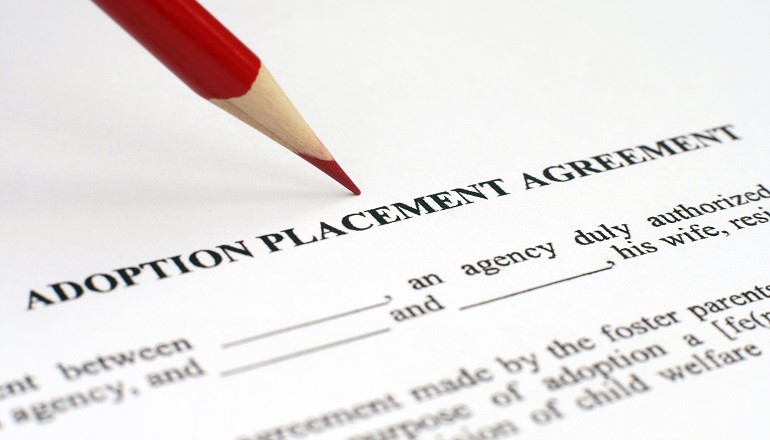Every domestic adoption in the United States is governed by state law. Each of the 50 states has its own set of interstate adoption laws, and these are far from uniform. Adoption laws address the basic questions: Who can adopt? Who can place a child for adoption? When may consents to adoption be signed? What if the birth father does not consent to the adoption? What are the adoptive parents allowed to pay for?
It’s becoming common for adopting parents and expectant mothers who reside in different states to find each other through the Internet or word of mouth. Sometimes, the adoption professional they work with is based in a third state. In a case such as this, which state’s laws apply? The answer is not always clear-cut. “Choice of law” analysis is one of the first issues that should be addressed in any interstate domestic adoption, and should be fully understood by both birth parents and adopting parents. A failure to understand the applicable state law in an adoption case can lead to serious consequences.
Agency or Independent?
The first step in determining the applicable state law is to understand how the adoption will be structured. From a legal point of view, every domestic adoption will be structured as either an “independent” or an “agency” adoption. In an agency adoption, the expectant mother will approach a child-placing agency to seek its assistance in choosing adoptive parents. The birth parents will relinquish their parental rights directly to the agency, making the agency the legal custodian of the child. The agency will then give its consent to the adoptive parents, who in turn will finalize their adoption in the appropriate court.
In an independent adoption (also referred to as a “private,” “parental placement,” or “non-agency” adoption), the birth parents and the adoptive parents locate each other without any agency’s assistance, and each party retains its own attorney. The birth parents relinquish their parental rights directly to the adoptive parents, who file these consents with their petition for adoption, and the appropriate court finalizes the adoption.
Agency Adoption
The substantive adoption law that will apply in a domestic agency adoption will almost always be the law of the state where the agency is licensed and operates. Then, the adopting parents are generally allowed to choose where to finalize the adoption; most do so in their own state, though some choose to finalize in the state where the placing agency is located, provided that the state allows non-residents to file in its courts.
Example: An agency in California is working with birth parents who reside in Colorado. The birth parents, through the California agency, select adoptive parents who reside in New York. In such a scenario, the Colorado birth parents will relinquish their parental rights to the California agency pursuant to California law. California law will dictate when they can sign their consents to adoption and how much time they will have to revoke those consents. It will dictate whether they will have to appear in court to sign their consents or whether they can sign outside of court. California law will also dictate what fees and expenses the adoptive parents are permitted to pay. The adoption would most likely be finalized in New York, where the adoptive parents reside, though the New York court will defer to California’s adoption laws, meaning that it will accept the termination of parental rights in California as well as the other aspects of California adoption law.
Satisfying the ICPC: In any interstate adoption, Interstate Compact on the Placement of Children (ICPC) approval must be obtained from the “sending” state (where the birth mother resides and the baby is born) and the “receiving” state (where the adopting parents reside) before the adopting parents can bring the child home.
Although the ICPC was not intended to dictate the choice of law in interstate adoption cases, some ICPC offices have established guidelines that influence how other states’ adoption laws are applied. For example, some state ICPC offices will not process an adoption case involving three states. Some state ICPC offices have taken the position that birth parents in their state may not place with an out-of-state agency, because that agency is not licensed in their state. And some states insist that birth parents execute consents in accordance with the laws of their state, despite the fact that the applicable adoption law is the law of a different state. This scenario is the most troublesome, as it can confuse the adoption process. It is important that placing birth parents fully understand which state’s laws will apply to the termination of their parental rights.
Independent Adoption
Choice of law analysis is more complex in independent adoption. As adoptive parents search for birth parents through the Internet, advertising, and networking, it is common for the parties to be spread out all over the country. The adoption process can follow the laws of the state where the adoptive parents reside and where they will file their petition for adoption, or the laws of the state where the birth mother resides. This will depend on the states involved and the applicable jurisdictional rules in each state. Approximately half of the states in the United States allow non-residents to file an adoption petition in their courts. Adopting parents sometimes hire an attorney in their state to parse the states’ laws and decide which to follow, and ultimately end up having to hire another attorney in the state where they will be filing.
Example: A birth mother who resides in Virginia chooses to make an adoption plan with adoptive parents who live in Maryland. Even though the baby will be born in Virginia, the adoptive parents will be able to apply Maryland’s adoption laws, because they reside in Maryland. They will be able to file their petition for adoption in the appropriate Maryland court. If this is what the parties agree on, the Virginia birth parents would sign Maryland consents to adoption and Maryland’s substantive adoption laws would control the process. The birth parents would be subjected to Maryland’s 30-day revocation period, and the adoptive parents could pay only fees and expenses that are allowed under Maryland law.
However, Virginia is a jurisdiction that permits non-residents to file adoption petitions in its courts. Thus, the Maryland parents can choose to follow Virginia law in completing their adoption. The birth parents would execute Virginia consents, which have a seven-day revocation period, and the adoptive parents would file a petition for adoption in a Virginia court.
When adoptive parents have a choice as to where to file their adoption petition, they may choose one state over the other for a number of reasons. The revocation period may be shorter in one state than the other. One state may permit adopting parents to provide living expenses to birth parents, while the other state prohibits such payments. One state may require the birth parents to appear in court to sign their consents to adoption, while the other permits the birth parents to sign out of court. One state may allow the adoption to be finalized in a shorter period of time than the other state.
Satisfying the ICPC: As with agency placements, the ICPC applies to all independent adoptions in which a child will be crossing state lines—and can, in some cases, affect choice of law. For example, some sending state ICPC offices will not accept an out-of-state consent to adoption, leaving the adoptive parents no choice as to which laws to follow and where to file. If the birth mother’s state does not permit non-residents to file in its courts, the adoptive parents may have to retain an agency in the birth mother’s state to complete the adoption. Such adoptions are often referred to as “directed agency” placements.
Unlike other areas of family law, adoption laws in the United States are not uniform. Adoptive parents who are pursuing an independent adoption should consult with an experienced adoption attorney, so as to understand which state’s laws will apply in their adoption. Likewise, adoptive parents working with a child-placing agency should be sure to understand the adoption laws that their agency will apply.






